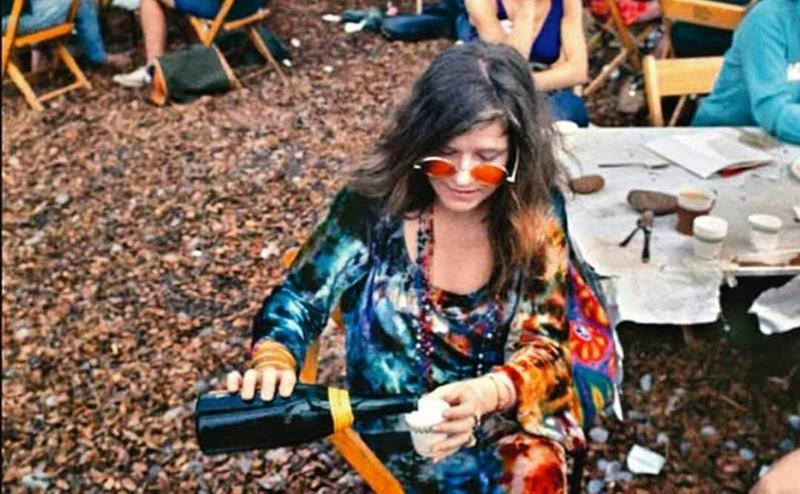The Story Of 'Mercedes Benz,' Janis Joplin’s Final Recording
By | July 9, 2018

The soulful classic rock singer Janis Joplin's "Mercedes Benz" is one of her most affecting songs, and it also happens to be the last recording she made before she died. Though it comes out of the gate seeming like a plea for a fancy car -- "Oh Lord, won't you buy me a Mercedes-Benz" is its first line -- the tune is actually an ironic rejection of materialism and the false satisfaction provided by money.
There's plenty to read into Janis Joplin's "Mercedes Benz" -- and it's not inappropriate to do so. The song was recorded on October 1, 1970. That's just over a year after the landmark Woodstock music festival had signaled the high point of '60s hippie optimism and the debacle at Altamont had, in a way, brought the whole party to a screeching halt. So many hippie anthems and ideas -- from "All You Need Is Love" to flower power -- seemed less-than-effective given the barrage of bad news: The Manson Family murders, the massacre at My Lai (and the Vietnam War in general), "Days of Rage" in Chicago, the shooting of student protesters at Kent State University. Maybe "flower power" wasn't really where it was at.
Joplin had always been more of a blues belter than hippie songbird, though she clearly relished the free-wheeling hippie lifestyle. With the massive downers of 1970, including the death of Jimi Hendrix in September, some gallows irony and existential questioning was in order. The free-love generation seemed to be wondering "is this all there is?" and Joplin's "Mercedes Benz" was wondering right along with them. The narrator of the song is a pitiable character, full of emptiness and envy, a hanger-on who is caught between wanting the party to continue and complaining that she never gets invited to good parties anyway.
Janis Joplin Died Three Days After Recording 'Mercedes Benz'

The October 1, 1970 recording session at which Joplin laid down "Mercedes Benz" was to be her last. On October 4, Joplin was found dead in her room at the Landmark Hotel in Hollywood, the cause an apparent heroin overdose. Joplin's death was the second in what would turn out to be a trio of unfortunate passings by classic-rock artists -- Hendrix had died in September, and Jim Morrison would die in July 1971. All three artists were 27 years old at the time of their deaths.
Janis Joplin Made A Splash With Big Brother & The Holding Company

In 1967, Joplin rose to prominence thanks to her performance at the Monterey Pop Festival, where she fronted the San Francisco psychedelic-rock band Big Brother and the Holding Company. After two albums with Big Brother, the group's self-titled 1967 debut and Cheap Thrills (1968), Joplin struck out on her own, releasing I Got Dem Ol' Kozmic Blues Again Mama! in 1969. The album wasn't as well received as her Big Brother albums had been. In 1970, she began playing gigs backed by Full Tilt Boogie, the band that would be credited on her final album, Pearl (1971), released posthumously.
Poet Michael McClure Gets A Writing Credit On 'Mercedes Benz'

"Mercedes Benz" was a song that originated from a line by poet Michael McClure, who was a friend and collaborator with many musicians of the time. McClure worked with Jim Morrison to bring out the Doors frontman's poetic side, for example. It was while noodling around with an autoharp given to him by Bob Dylan that McClure, a practitioner of haiki, came up with the line "C'mon God, and buy me a Mercedes Benz."
Bob Neuwirth Gets A Writing Credit Too

In August, 1970, at a bar in Port Chester, New York, Joplin was jamming and riffing with another poet, Bob Neuwirth. They played with McClure's line, altering it slightly and using it to weave several verses from the point of view of a narrator who asks the Lord to solve her problems. As Joplin spontaneously composed the song, Neuwirth scribbled the lyrics on napkins. Two months later, the song was recorded in a single take. Joplin, McClure and Neuwirth shared co-writing credits, which ended up making quite a difference in McClure's life. Poetry, on its own, is not too financially rewarding, but a lyric for a frequently-played pop song is a different story.
Ironically, Janis Joplin Actually Drove A Porsche

Oh, Lord, won’t you buy me a Mercedes Benz?
My friends all drive Porsches, I must make amends.
These are 2 lines of the famous “Mercedes Benz” song. Joplin herself drove a 1965 Porsche (with a famous psychedelic paint job), which is really of no consequence when you consider the meaning Joplin wanted fans to take away. To Janis Joplin, “Mercedes Benz” was more of a message to society that we tend to place too much value on material possessions and money as a way to happiness. She was attempting to dispel the mindset that money can buy happiness.
Joplin’s intended message was like a mantra to the counterculture generation, that it was OK not to conform and keep up with the Joneses.
Auto Manufacturer Mercedes-Benz Eventually Used The Song In Advertising

Although the song has an anti-commercialism message, that doesn't mean it will never show up in a commercial. As the hippies aged into conspicuous consumers also known as Baby Boomers, companies competing for their dollars founf that amazing music from all those years ago was an effective marketing tool. So it was that in 1995, Janis Joplin's "Mercedes Benz" -- a song that implies a fancy car won't actually make you happy -- became the theme song of the brand. The objective was to freshen up the Merceds persona, which was perceived as stuffy. And if there's one thing Janis Joplin wasn't, it's stuffy.
